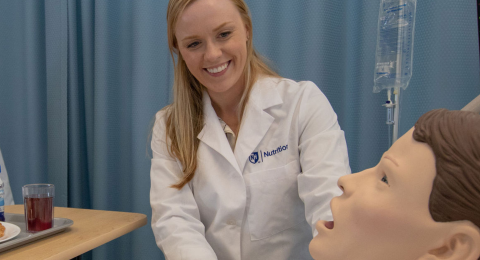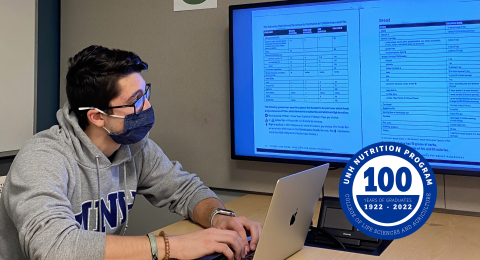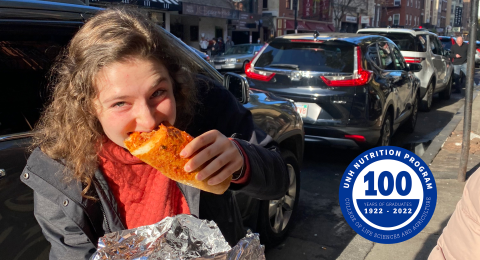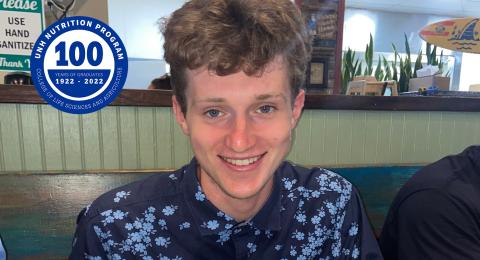The nutrition program celebrated 100 years of graduates in 2022 and commemorated the milestone with special events and stories throughout the year. Learn more here.
About the Nutrition program
Nutrition is an interdisciplinary science based on biochemistry and physiology, but can also be enriched with sociology, psychology, molecular biology, and genetics.
At UNH, you have three curriculum options for pursuing a bachelor's degree in nutrition. These are:
- The Dietetics Option is the first step to becoming a registered dietitian. The Didactic Program in Dietetics (DPD) curriculum is accredited by The Accreditation Council for Education in Nutrition and Dietetics (ACEND). It prepares you for a dietetic internship.
- The Health and Wellness Option provides a foundation in chemistry, anatomy, physiology, and microbiology and includes courses on stress, wellness, and exercise science. Students gain real-world experience providing hands-on nutrition and health guidance.
- The Nutritional Sciences Option provides an extensive background in biology, chemistry, physiology, nutrition, biochemistry and physics, and includes courses on nutritional assessment, life cycle nutrition, nutrition and health and careers in nutrition.
Students typically declare an option within the nutrition major no later than the second semester of their sophomore year.
What is nutrition?
Nutrition is the study of food and its relationship to human health. Students pursuing a bachelor’s degree in nutrition at UNH have three specialization options to choose from: dietetics, which is geared toward students interested in becoming registered dietitians; health and wellness, which prepares students for work in fields ranging from fitness to community health; and nutritional sciences, which prepares students for further study in areas such as medicine or physical therapy, or for technically oriented jobs in science.
Why study nutrition at UNH?
The nutrition program at UNH opens pathways to a wide range of careers while providing students with a comprehensive understanding of the relationship between food, metabolism, nutrients and our health. Our degree options provide opportunities for hands-on learning through a variety of internships and research. The UNH-in-Italy program allows students to experience the medieval city of Ascoli Piceno while studying English-language courses that explore the links between food culture, sustainable agriculture and the policies and issues impacting the food system.
Potential careers
- Biotechnologist
- Clinical dietitian
- Dietary counselor
- Educator
- Food product development scientist
- Hospital or care facility consultant
- Nutrition writer
- Public health nutritionist
- Registered dietitian
- Regulatory affairs specialist
- Researcher
- Sports dietitian
- Wellness consultant
Curriculum & Requirements
Nutrition is the study of food, the nutrients found in food, and the body’s metabolism of these nutrients to maintain and promote health. Nutrition is an interdisciplinary science based on biochemistry and physiology, but also integrates sociology, psychology, molecular biology, and genetics.
Students have three curriculum options within the major to pursue a bachelor's degree in nutrition. The option is declared within the nutrition major before the end of the second year in the program. Options include:
- Dietetics option - is the first step to becoming a registered dietitian. The Didactic Program in Dietetics (DPD) curriculum is accredited by The Accreditation Council for Education in Nutrition and Dietetics (ACEND). It prepares you for a master's degree and dietetic internship.
- Health and Wellness option - provides a foundation in chemistry, anatomy, physiology and microbiology and includes courses on wellness and community health. Students gain real-world experience providing hands-on nutrition and health guidance.
- Nutritional Sciences option - provides a comprehensive background in biology, chemistry, physiology, nutrition, biochemistry and physics, and includes courses on nutritional assessment, life cycle nutrition, nutrition and health, and careers in nutrition.
The program prepares students for success by offering real-world learning opportunities throughout the curriculum. These opportunities include applied research, field experiences, internships, community engagement, and study abroad offerings. Our diverse group of faculty are dedicated to student success in and outside of the classroom. Coursework supports diverse postgraduate pathways including allied health programs, medical and dental schools, and graduate school. The rigorous curriculum is designed to offer a science-based foundation and foster critical-thinking and strong communication skills for future professional success of our students.
Degree Requirements
All Major, Option and Elective Requirements as indicated.
*Major GPA requirements as indicated.
Major Requirements
Students take 16-18 credits per semester. All students complete foundational courses in the sciences, nutrition core courses, and additional option-specific requirements as noted in the program descriptions (i.e. Dietetics, Nutrition and Wellness, and Nutritional Sciences). Discovery Program requirements (including the Inquiry requirement in the first two years) and elective courses are taken as well.
| Code | Title | Credits |
|---|---|---|
| NUTR courses: | ||
| NUTR 400 | Nutrition in Health and Well Being | 4 |
| NUTR 401 | Professional Perspectives on Nutrition | 1 |
| NUTR 476 | Nutritional Assessment | 4 |
| NUTR 650 | Life Cycle Nutrition | 4 |
| Foundation courses: | ||
| BMS 507 | Human Anatomy and Physiology I | 4 |
| BMS 508 | Human Anatomy and Physiology II | 4 |
| SOC 400 | Introductory Sociology | 4 |
| or PSYC 401 | Introduction to Psychology | |
| Statistics course (choose one): | 4 | |
BIOL 528 | Applied Biostatistics I | |
HMP 540 | Statistics for Health and Human Service Professionals | |
PSYC 402 | Statistics in Psychology | |
SOC 402 | Statistics | |
Student Learning Outcomes are outlined within the Nutrition Major program options pages, see:
- Nutrition: Dietetics Option (B.S.)
- Nutrition: Health and Wellness Option (B.S.)
- Nutrition: Nutritional Sciences Option (B.S.)
Explore Program Details
Initial Admission to the major as a First-year or Transfer Student
Students entering the University as first-year or transfer students may declare Nutrition as part of the UNH admission process. First-year and transfer students who are admitted directly into Nutrition will be assigned an academic faculty advisor who will work with you throughout your course of study.
Change of Major Requirements for Existing UNH Students
We welcome UNH students who wish to declare the Nutrition Major or change their major from other degree programs. Applications are reviewed on a rolling basis; see below for entry requirements.
What Are the Steps to CHANGE My Major?
To facilitate a change of major into Nutrition, students should complete two steps*:
1) Submit an application requesting the transfer from another degree program. This online application is then reviewed by the program coordinator. Students are assigned an academic faculty advisor who will work with you throughout your course of study.
2) Request to change your major in Webcat. A tutorial for the process of changing a major is available.
ARE THERE REQUIREMENTS TO CHANGE MY MAJOR?
Current UNH students wishing to change their major and join the Nutrition Program must have:
- Earned a minimum of 12 UNH credits
- Completed OR be enrolled in NUTR 400 and NUTR 401
All students may transfer into one of the following:
- Nutrition: No Option
- Nutrition: Health & Wellness
- Nutrition: Nutritional Sciences
Students interested in transferring into the Nutrition: Dietetics Option, must also meet the following 3 requirements:
- Minimum GPA of 3.0
- Minimum earned grade in introductory nutrition (e.g. NUTR 400) = B
- Minimum earned grade in one semester of chemistry w/lab or anatomy/physiology with lab = C+
Students admitted to the Nutrition major at UNH are required to declare, and be formally admitted into, one of the following options:
Nutrition majors designate an option once they have successfully completed: 1) NUTR 400, 2) NUTR 401, & 3) BMS 507 or CHEM 403 (CHEM 411 for Wellness). The Fall and Spring semester deadlines are September 15th and February 15th, respectively.
CHANAS is a wonderful venue for those interested in undergraduate and graduate research projects. Each semester UNH students work as research assistants for the project and, in the process, gain valuable research and clinical skills.
Advising is available for UNH students, alumni, and post baccalaureates pursuing health professional careers.
The Pre-Health Advising Office provides support throughout the process of preparing for health professions school from advising on the courses they should take to helping navigate through the complex steps of the application process.
Register with Pre-Professional Health Office


















